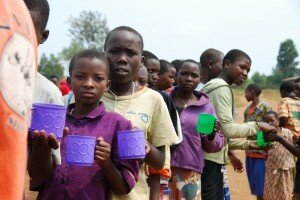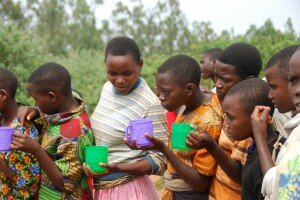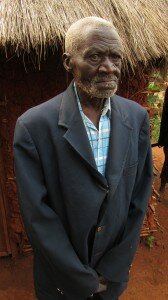Part three of our four part series featuring award-winning producer Jessica Stuart’s stories from the field:
Wednesday, June 22nd, 2011 – Karuzi
We travel 4 hours of bumpy, dusty roads- passing through tea plantations, getting into traffic jams with cattle, to reach the Karuzi Province. This is a place that doesn’t often have outside visitors, so the cars themselves were a spectacle of mass proportion; not to mention the blonde sunburned woman and the tall South African man with sound gear strapped to him.
We visited a school called Canzikiro and were greeted by thousands of smiling faces. And yet, I am great crowd control because children think I am a ghost or an angel, they either run away or run to me!
We spoke with a teacher and she enthusiastically told us that she sees more children coming to school because they are healthy and because their families are healthy. She has seen a difference of children paying attention in class and able to focus. The teacher, herself was pregnant. She miscarried the first time, possibly due to anemia from worms herself, but is looking forward to the birth of her first baby next month. There is possibility.
In the afternoon we traveled down more bumpy roads to Bugenyuzi,, a community with approximately 11 percent of the population suffering from Trachoma. This is a new program and the inhabitants of this community press us for more. They want to know when we are coming back, when the next round of medicine is coming, and how we can help stop the suffering. The area we are in is difficult to get to. The word “remote” doesn’t do justice to its location. These are the bottom billion. These are the poor that are rarely reached, stuck in a cycle of poverty, yet with a desire to do for themselves. They just need a lift, a boost; and we can do that for less than 50 cents. The drugs are there. The knowledge is there. We can eliminate NTDs even from the places and in the corners no one is looking.
That evening, we sit down to a goat brochette, a gin and tonic and a cold shower from a bucket and a cup. There are no mosquito nets, so I sleep with my hooded sweatshirt on, a half bottle of DEET burning my skin, and hope for the best.Malaria is the least of my worries at this point.
Continue reading





